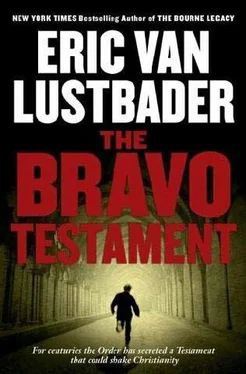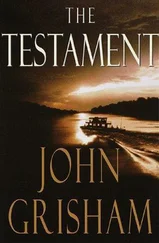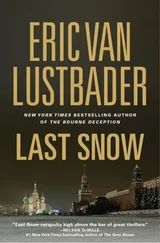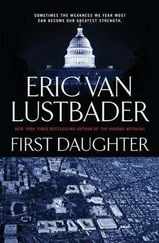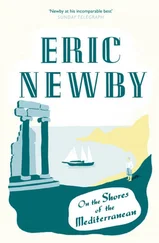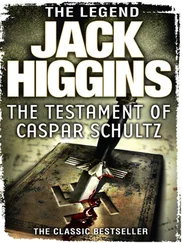The chairs were as uncomfortable as they looked. Bravo and Jenny settled themselves as best they could. Through his anger, his assessment of the new information, Bravo did not lose sight of his mission. He made a mental note to call Emma at the earliest opportunity. Maybe she'd gotten a lead on the mole, but as soon as he thought it he knew he was whistling in the dark. Surely his sister would have called him if she'd made even the slightest progress.
The priest spread his hands. "I suppose you've been told that the Order came here because there was no love lost between Venice and Rome, and that's true, so far as it goes." He sat forward, his fingers steepled. "There was, however, another, far more compelling reason. To understand it, we must go all the way back to 1095, when the call went out for the first Crusade.
"Venice is remembered almost solely as a city-state of superb politicians, and that's true-again, so far as it goes. 'Keep safe from stormy weather, O Lord, all your faithful mariners, safe from sudden shipwreck and from evil, unsuspected tricks of cunning enemies.'" His forefinger wagged back and forth. "Cunning enemies, you see? Even then. But I'm getting ahead of myself.
"The prayer I just recited is recorded in the earliest histories of La Serenissima, spoken on the Day of Ascension when the doges of Venice were married to the sea. Because the Venetians were, first and foremost, a seafaring people.
"When the call went out from Rome for able swords to travel to the Holy Land, you would think that those who responded were of a religious bent, wanting to earn their way into the next life. But no, only a handful were soldiers of the Lord; the vast majority of those who took up arms to fight for Rome were opportunists who saw in the wholesale slaughter to come the chance to carve out for themselves fiefdoms, states, even empires in the Levant, as the Middle East was then called."
He raised a hand. "I am well aware that both of you are familiar with this era, but I beg you to indulge me for a few moments."
He rose and came around to stand in front of Bravo and Jenny. It was clear that he was at his most comfortable lecturing. Both his manner and his speech were distinctly old-fashioned, as if he had come from centuries past.
"The doges of Venice were as initially giddy as their rivals in Genoa, Pisa and, latterly, Florence to acquire bases in the Holy Land. Until, that is, they were advised by members of the Order, who pointed out that it would be far better to let others fight and die over foreign lands. Their wise counsel was this: while your rivals fight for land, you use your navy to control the sea. The sea? the doges said. Why would we want to control such a vast and inhospitable place? Because, we told them, when you control the sea, you control trade, not merely in the Adriatic, but in all of the Middle Sea, which we now call the Mediterranean. Through your invincible navy you will set levies on all of the ships coming into Italy from any country, you will regulate trade so as to benefit Venetian business and thus gain more favorable trading terms for your merchants, who will prosper no matter the outcome of the wars.
"Of course the Order had its own reasons for wanting Venice to control trade in the Mediterranean. We wanted to gain safe passage to and from the Levant, because already we had in our possession secrets which hinted at others-far greater-that were buried or had been hidden in areas of the Oltremare."
"Yes, yes," Bravo said, "the Beyond-the-Sea-Cyprus, Syria and Palestine."
"Oh, not only there, but also along the southern lip of the Black Sea, in Trebizond."
He cleared his throat, a certain sign that he did not care to be interrupted. "So persuasive were we that for four hundred years Venice pursued the single-minded goal of superiority at sea. They could not use blockades because ships of that time were neither built or provisioned to stay at sea for long periods of time, so they concentrated on what they knew: convoying their merchant ships from port to port and raiding enemy ports and shipping routes in a cut-and-run fashion.
"By suggesting they use the masts of their warships as siege towers, it was the Order who helped the knights of the Crusades take Constantinople; by their esoteric knowledge of the land beyond the Oltremare, it was the Order that helped the Venetian brothers, Nicolo` and Matteo Polo, father and uncle of Marco. Having heard through our web of highly placed contacts that the Genoese had aligned themselves with the Greeks, who had subjugated the Levant previously, to retake Constantinople they spirited the Polos and as many other Venetians as they could out of the city. Those they could not find or who would not heed their warning were subsequently captured and treated as pirates-were either blinded or had their noses cut off.
"A traitor aided the Greeks in their successful assault on Constantinople, and less than a century later it was another traitor within the court of David Comnenos, Emperor of Trebizond, that caused the city to fall to the Ottomans. We were there, too, the day Trebizond fell, and took from there secrets beyond compare."
"This is all fascinating," Bravo said, "but I came here for a reason. Where is-"
Father Mosto, having jumped off the corner of the desk, now held up his hand. "Listen to me, Braverman Shaw. Each time a traitor has appeared a terrible flow of deaths has resulted, and the Order has been severely set back in its mission. Each time we know that the Knights of St. Clement orchestrated the plan, seducing one of ours to their side. We are in such a period now, and this time our very existence hangs in the balance.
"As you have said yourself-as your father fervently believed-there is a traitor in our midst. What you perhaps do not know is that it was Dexter Shaw's task to ferret out this traitor, capturing him so that through his subsequent interrogation we could trace the conduit back to its source and destroy its head once and for all."
"Interrogation," Bravo said. "You mean torture, don't you?"
"The intelligence needs to be extracted by any and all means."
Bravo shook his head. "My father would never consent to torture another human being."
"The plan was his own idea," Father Mosto said. "It was born of desperation, but all of us in the Haute Cour-the traitor included, ironically-agreed. We're in a war, Braverman. Here, today, at this very moment, there is only survival or death." He made a sweeping gesture. "This is why I must insist that what transpires next be between you and me only."
Jenny jumped up. "I'm not a traitor."
"Braverman certainly believes you're not," Father Mosto said, "but today, at this moment, I do not have that luxury, I am full of suspicion for anyone who is not Dexter Shaw's son."
"How could I be the traitor?" Jenny said hotly. "We all know that he's a member of the Haute Cour."
"In league, perhaps, with a member of those who guard the Haute Cour."
Bravo looked at him. "You don't really believe that, do you?"
"Half of the Haute Cour has been murdered in a span of less than two weeks. Where was their vaunted protection?" Father Mosto shook his head. "The time for making simple assumptions or taking chances is past. Your father would understand, Braverman, and so must you."
Bravo stood, thinking for a moment. At length, he turned to Jenny and said, "Please stand outside the door."
"Bravo, you can't mean that-"
"I need you to make sure we aren't disturbed."
Her face hardened and then she nodded once, curtly. She left the rectory without glancing at the priest.
When they were alone, Father Mosto said, "Do you trust her?"
"Yes," Bravo said at once.
"Absolutely?"
"She was my father's choice. It was his express wish-"
"Ah, yes, your father." Father Mosto's fingers knitted together. "Let me tell you something about your father. He was prescient in a way none of us understood. I wouldn't say he could see the future, exactly, but he seemed to know how things were going to end."
Читать дальше
